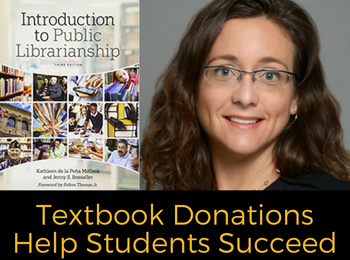DRAFT
Jenny Bossaller, Associate Professor at the School of Information Science & Learning Technologies, donated a copy of the third edition of Introduction to Public Librarianship, which she coauthored with Kathleen de la Peña McCook, to Mizzou Libraries as well as other libraries in the MU system and the Daniel Boone Regional Library.Though she has used different editions of this book over the years in the her Introduction to Public Libraries class, this is the first edition she helped edit and write.
By the time that course is offered again next year, Jenny plans to have given all ten of her author copies of the book to libraries around the state, including more public libraries. She says, “I think that’ll be helpful for all the online students.” When the course is in session, she’ll ask Mizzou Libraries to pull the text from general circulation and put it on reserve so that her students will have access to it if they can’t afford to purchase their own copy.
As a teacher, Jenny “loves having a textbook” for this course because it’s comprehensive, with one chapter per week of the semester, and “it’s sequenced in a way that makes sense together as a book.” She finds building off a core text with supplemental materials easier than cobbling together a course from scratch. “The goal,” she says, “is to give them professionally edited and accurate materials and then making them as inexpensive as possible.”
Even with online courses, certain telltale behaviors can signal that students have been unable to afford the textbook, such as not referring to the readings themselves in discussion board posts. Even if students can fake it to get by in the course, Jenny says, “they’re really missing out.”
“We’re in an interesting transition phase with textbooks,” Jenny says. For example, the next edition of Introduction to Public Librarianship, probably five or six years from now, will be what she calls a “good compromise”: a smaller book with a lot more open educational materials available via a companion website. Like many faculty, she’s encountered OER textbooks that are not as professionally produced as those from traditional publishers. Additionally, writing textbooks is not traditionally as valuable for tenure and promotion as other types of publications.
GRACE
“If you have a textbook, put it on reserve for your students because not everybody can afford to buy the textbook,” Jenny advises fellow faculty. She also encourages faculty to work with publishers to see if they will grant access to the PDF of the textbook for a reduced price. SHE’S NOT SURE HOW IT WORKS–WOULD GO THROUGH THE LIBRARY? AS PART OF A PACKAGE?
Because many university libraries in the U.S. do not purchase textbooks as a rule, she says faculty are sometimes confused as to whether they should give their textbooks to the library or not. QUESTION FOR THE LIBRARY
PROCESS FOR DONATING TEXTBOOKS
“I do love MU’s OER initiative, and the incentives that they’re providing are very helpful,” Jenny says, “but for now, this is what I could do to contribute to making this textbook more freely available for our students through the library.”
